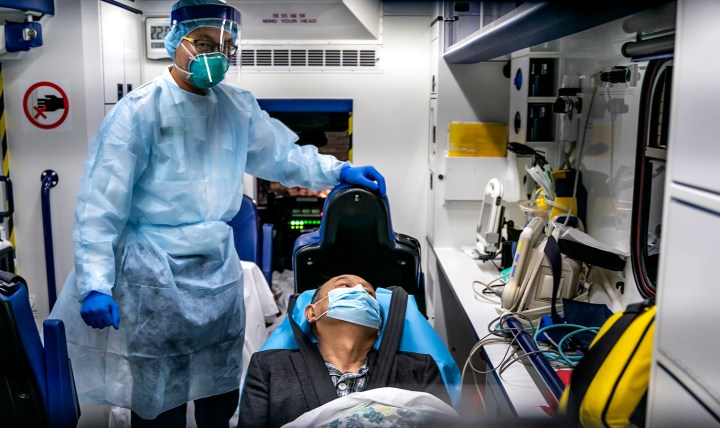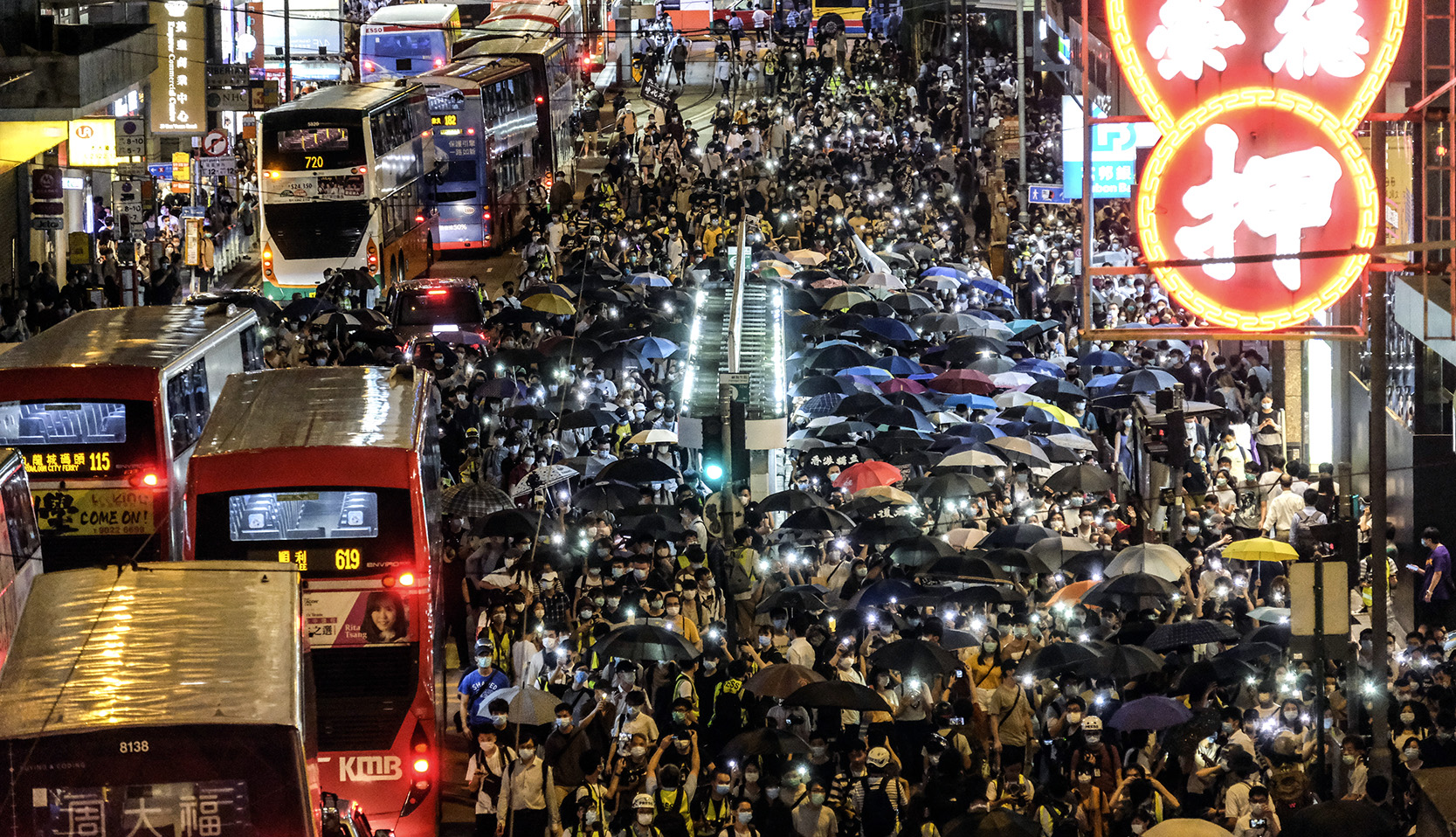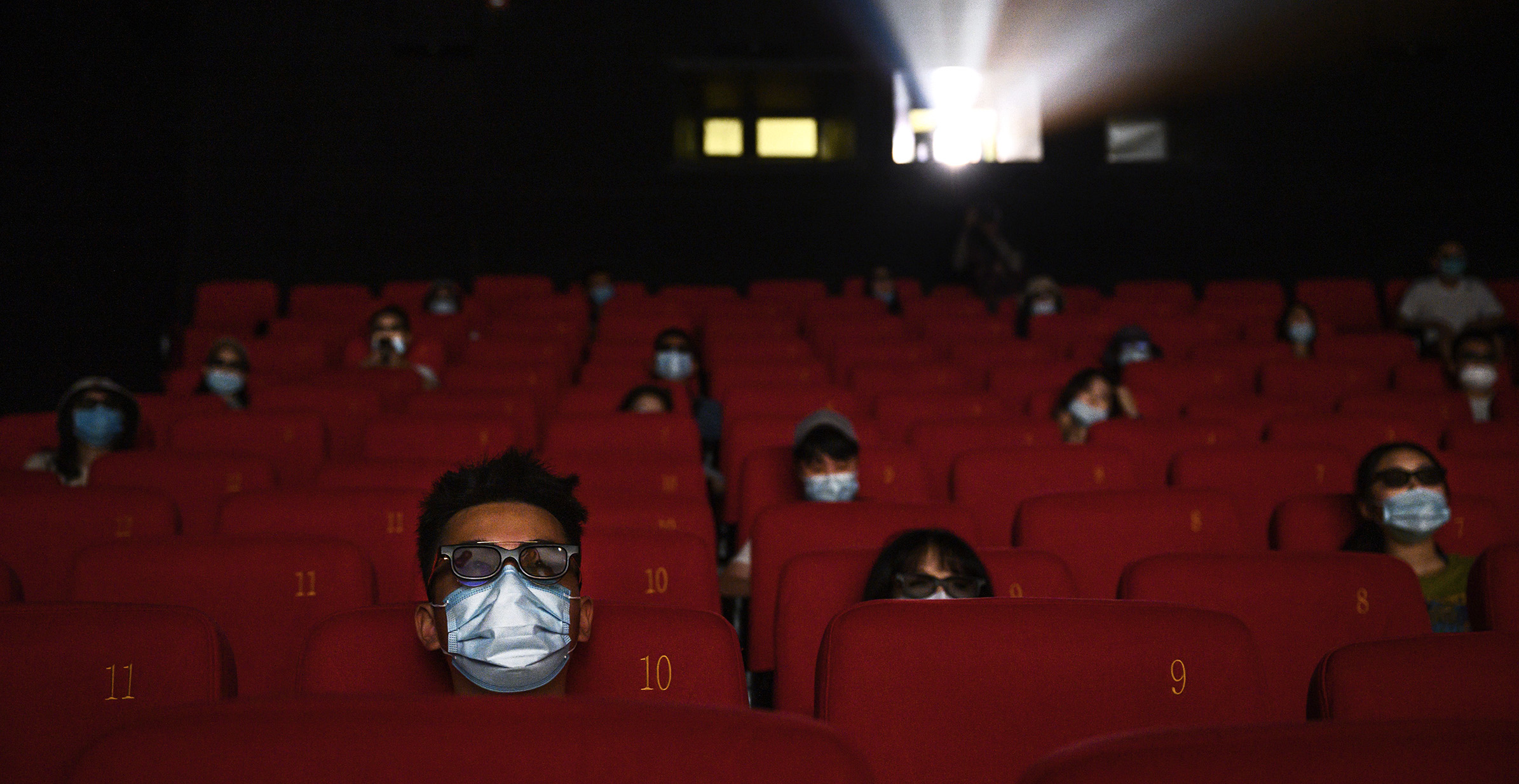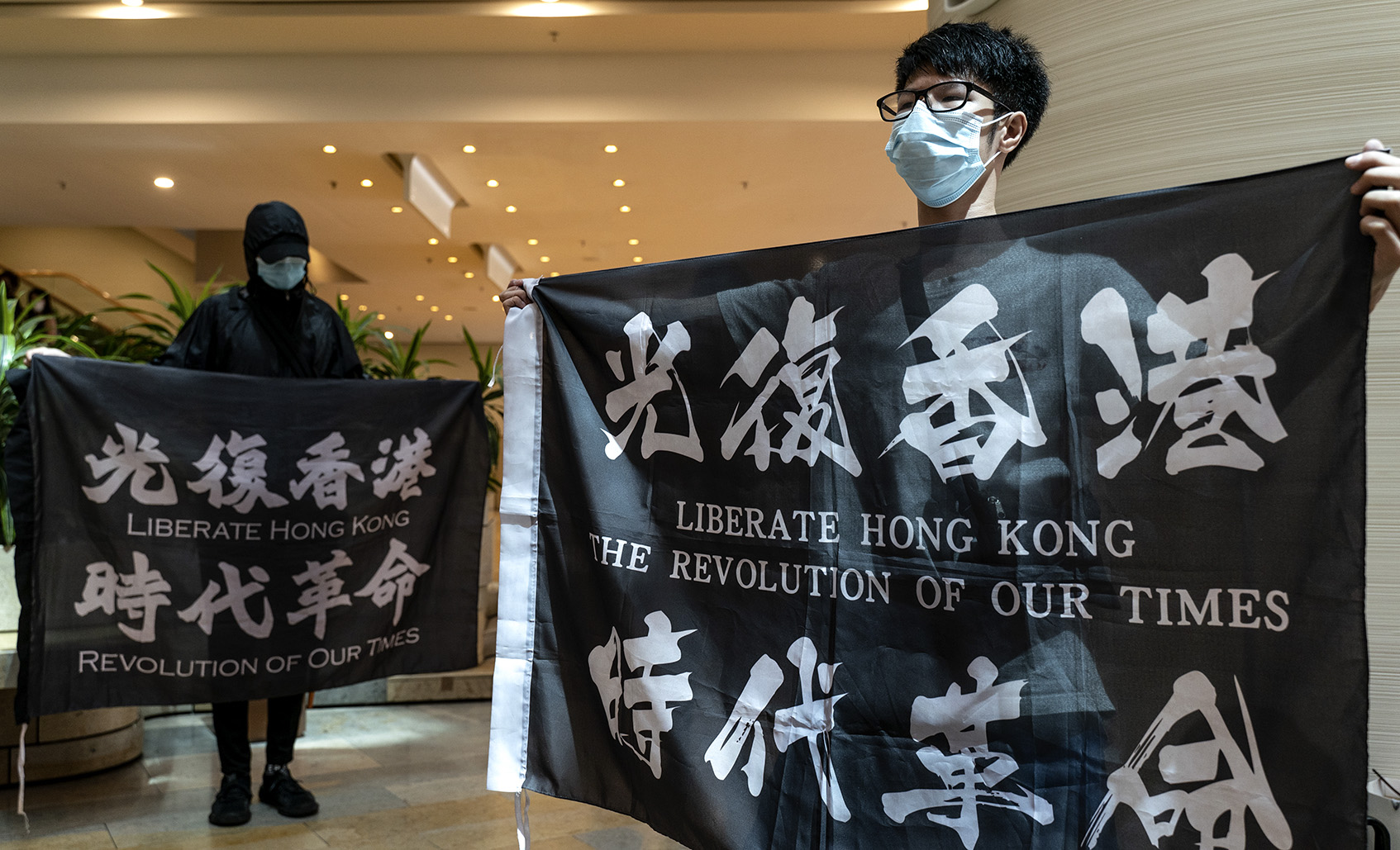Maverick Citizen Op-Ed
China manages the virus with surveillance, organisation and repression

This is the fourth article in a six-part series that looks at how the Covid-19 pandemic is playing out in the BRICS countries.
Part one: Introduction. Part two: Russia. Part three: Brazil. Tomorrow: India.
China’s response to what is now known as the Covid-19 pandemic was entirely consistent with both its global and domestic political strategies. Globally, the Chinese regime needs to project its reputation as an emerging superpower with a highly capable technocratic state. Domestically, its legitimacy rests on its ability to ensure high growth rates and the safety of its people, while at the same time ruthlessly controlling dissent.
Its initial response to the unknown virus in the city of Wuhan was to attempt to conceal its presence – but once its contagiousness and virulence became clear, it moved rapidly to impose a tightly regulated lockdown on the city, facilitated by its formidable apparatus of surveillance and social control, including a multitude of state officials, local party organisations and the system of resident’s committees for each apartment block. At the same time, it mobilised the health system, building new hospitals and drafting in health workers from other parts of China to treat the rapidly growing number of seriously ill citizens.

Demonstrators march on Des Voeux Road Central during a protest in Hong Kong. (Photo: Roy Liu / Bloomberg via Getty Images)
Nonetheless, it was soon overstretched, its hospitals overwhelmed and health workers falling sick because of limited protective clothing and equipment. While the state under President Xi Jinping has systematically cracked down on activists, trade unions and other organisations, in Wuhan volunteer networks quickly emerged to raise funds, source protective clothing, and distribute this to hospitals and health centres in need, as documentary filmmaker Ai Xiaoming records in her diary.
This lack of preparedness of state institutions was shocking. “I can barely believe that our public healthcare system could be so vulnerable and fragile; that our medical resources are so scarce is beyond my imagination. In such circumstances, how can public life and safety be guaranteed?” she writes. Selfishness and meanness among the general population prompted thoughts on her part about the “frailty of our social psychology, the flaws in our social management and in political institutions governed without freedom of speech and freedom of press”.

People wear protective masks as they watch a movie in 3D at a theatre on the first day they were permitted to open on 24 July 2020 in Beijing, China. Cinemas in China’s capital city re-opened after being closed for six months due to the Covid-19 pandemic. (Photo: Kevin Frayer / Getty Images)
In contrast, the volunteers’ commitment to the public good despite personal danger signified the emergence of shared values and the “opportunity for new social forces to grow”.
What has been the overall effect on the legitimacy of the Chinese regime? The official control of information makes it difficult to assess this, but we do know that there was a strong wave of public anger on social media at the victimisation of those doctors who first blew the whistle about the new virus, and subsequently died of it. Whether the success of the effort to contain the virus and the rapid response of the state to the new outbreak in Beijing will be enough to restore popular faith in the competence of the authorities is unknown.

Covid-19 patients (at the rear) wait to be transferred from Wuhan No 5 Hospital to Leishenshan Hospital, the newly-built hospital for Covid-19 patients, in Wuhan in Hubei province on 3 March 2020. (Photo: Str / AFP via Getty Images)
In contrast, the free flow of information in Hong Kong makes the situation there much easier to analyse, and it can be seen as an arena in which the authoritarian Chinese state confronts popular challenges. Hong Kong was a British colony from 1842 until 1997, when it was handed back to China. A global financial centre and an important location for interaction between the world capitalist economy and China’s post-Communist economy, Hong Kong is governed under the “one country two systems” arrangement, which preserves Hong Kong’s capitalist system, civil rights and limited democracy.
During 2019, Hong Kong was rocked by a massive and growing protest movement against a law allowing extradition to China. The city was regularly paralysed by protests, occupations and street battles – the biggest protests bringing together two million residents out of a population of 7.5 million – producing an economic recession. The protests have opened up new frontiers of struggle.

Pro-democracy supporters hold banners and shout slogans as they march in a shopping mall during a lunch protest on 12 June in Hong Kong. (Photo: Anthony Kwan / Getty Images)
First, a movement to patronise pro-democracy independent businesses has flourished. From restaurants and online retail stores to professional and personal services, a “yellow economic circle” (the colour of the movement) is embedding the movement in citizens’ everyday life, providing capital, employment and supply chains independent of China. The yellow economy has been so successful that the pro-China elite and media have repeatedly launched campaigns to ridicule it as irrational and nonviable.
Second, during the protests, a new wave of unions emerged to organise employees across a wide spectrum of sectors. Seeing unions as both political and labour organisations, labour rights as civil rights, political struggles as economic struggles, young unionists are poised to redefine the meaning of unionism for Hong Kong. Some 1,600 new unions have filed for registration in recent months, which Hong Kong’s obstructionist government claims would take it 50 years to process.

Andrew Wan, a pro-democracy lawmaker, is arrested by riot police during a pro-democracy protest in Hong Kong on 1 July 2020. (Photo: Roy Liu / Bloomberg via Getty Images)
Then, building on the big victory by pro-movement candidates in the district board elections late in 2019, a bold election campaign is under way to capture the majority in the Legislative Council election in September 2020. Meanwhile, young and veteran politicians are working with the Hong Kong diaspora in diplomacy efforts to lobby governments to enact human rights protection for Hong Kong.
The politically battered Hong Kong government, left without any public legitimacy, was inept and slow in its response to the pandemic. According to academic Zeynep Tufekci of the University of North Carolina, the activists of the protest movement took the lead, using all the tactics and structures developed during the protests.

A couple enjoys a moment at a typhoon shelter at sunset in front of the Hong Kong skyline on 30 July 2020. (Photo: Anthony Kwan / Getty Images)
Immediately the first known case of coronavirus infection was announced, they established a new website to track cases, monitor hotspots, report hospital waiting times and provide other relevant information. The practice of masking in public was adopted by all Hong Kongers while the government dilly-dallied, and mask brigades tackled the shortage by acquiring and distributing masks, especially to the poor and elderly. Teams moved through the crowded poor districts, installing sanitiser dispensers and refilling them when necessary. Activists also mobilised a campaign to wear white ribbons in support of medical workers.
According to Tufekci, networks not only mobilised to protect their citizens, but also to resist government and make demands. One of the new unions organising health workers pulled off a five-day strike by 8,000 medical workers demanding that the government close the borders with China in the early days of the outbreak. In another action, when the Hong Kong government set up quarantine centres in dense neighbourhoods without consulting the people who lived nearby, local activists firebombed the as-yet empty building, and the quarantine was relocated to sparsely populated holiday villages.

An impersonator of North Korean leader Kim Jong Un waves while holding an inflatable rocket with picture of Chinese President Xi Jinping during a protest in Hong Kong on 1 July 2020. Hong Kong woke up to a new reality after China began enforcing a sweeping security law that could reshape the financial hub’s character 23 years after it took control of the former British colony. (Photo: Lam Yik / Bloomberg via Getty Images)
These efforts from below were highly successful in containing the pandemic. The result was that Hong Kong was able to reopen very rapidly, although a lack of government will has led to a surge in new infections.
The depth of popular activism, though, was unacceptable to the Chinese regime. At the end of June 2020, the National People’s Congress imposed a National Security Law on Hong Kong, in clear violation of the city’s mini-constitution requiring that laws be enacted by the local legislature. The law prohibits “acts of secession, subversion, terrorism or conspiring with foreign influences”, all expansive categories and arbitrary words in the Chinese Communist lexicon. Mainland Chinese security agents may implement the law in Hong Kong, banning organisations and imprisoning individuals deemed threats to national security.
With this latest move, Beijing is sending at least two messages. To its own people, the Communist Party shows its iron will to quell dissent at all cost, especially when the Chinese economy faces the most serious headwind in decades. Hong Kong has an outsized effect on mainland Chinese when it comes to citizens’ protests. In the last decade, public marches have been a popular item on the unofficial itinerary of millions of Chinese tourists flocking to the city.
Between their shopping sprees and culinary expeditions, many join or marvel at the spectacle of peaceful large-scale rallies. From Beijing’s perspective, if Hong Kong gives mainlanders their first forbidden taste of civil liberty, it should also be the example for the consequences of demanding more freedom.
One inadvertent consequence of Beijing’s latest action is that it further liberates people’s political imaginations from the confines of the “one country, two systems” structure. The new law is tantamount to ripping up this road map, and freeing people to find their own paths out of the woods, perhaps ending up in a new destination. To Beijing’s utter dismay, the resounding new slogan in recent street and mall protests has become “Hong Kong independence, the only way out”, chanted side-by-side with the movement’s signature motto, Liberate Hong Kong, revolution of our times.
The new law has certainly deepened people’s anguish and anger, as the city braces for emigration, capital outflow, political persecutions and more. But beyond the headlines, many Hong Kongers are quietly digging in for a long fight informed by visions of a better society. Activists have been deleting their social media profiles and closing down some of the pro-democracy organisations they believe will be vulnerable to prosecution under the new law.
Protests, though small, have continued, often with blank posters rather than slogans that might attract prosecution. A few days after the new law was imposed, 600,000 Hong Kongers participated in a public ballot organised by activists to select favourites from among the democratic ranks to stand as candidates in the September 2020 elections.
China’s high-profile move to shut down the democratic movement deepens its aggressive international strategy to assert its domination of the region and to aggressively challenge declining Western hegemony, and in particular the power of the US. It is also symptomatic of its strengthening economic power and integration into the world economy, in the sense that it signals that China no longer needs a global financial metropolis on its doorstep, given the deepening and the resilience of its own financial markets.
Its move has triggered increasing antagonism from the West and unease from some of its neighbours, and others in the global south. Time will tell whether its Hong Kong move will be successful, or counterproductive. Time will also tell whether the Hong Kongers will be able to sustain and deepen their resistance in the face of China’s ruthless surveillance state. DM/MC
Karl von Holdt is at the Society, Work and Politics Institute, University of the Witwatersrand, Johannesburg.
This article is the third in a collection that comes out of a collaborative project comparing neoliberal politics and social movement responses in the BRICS countries, generously supported by the National Institute for the Humanities and the Social Sciences (NIHSS) in South Africa. It is republished with permission from The Wire, an independent online publication in India, and the original can be found here.
Covid-19 in Russia: Mishandling has led to popular protests, but Putin remains strong
Bolsonaro’s handling of Covid-19 has unleashed a layered crisis in Brazil




















 Become an Insider
Become an Insider